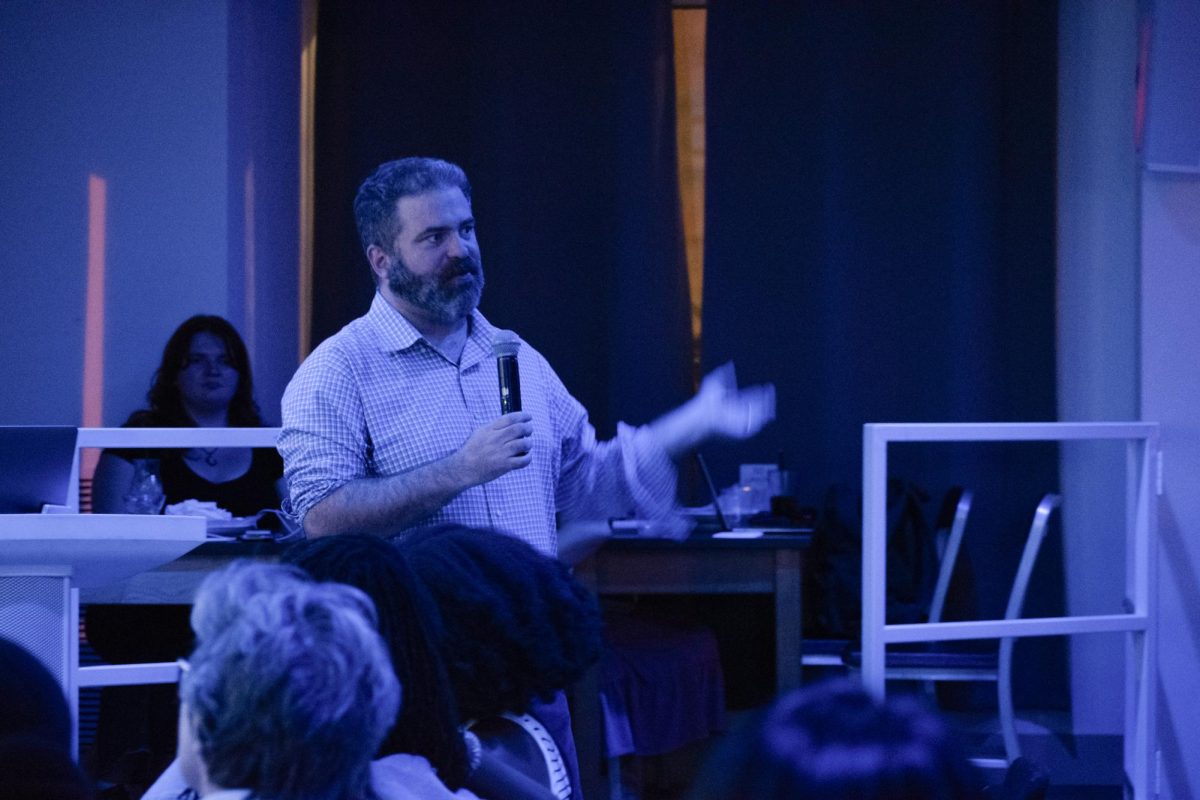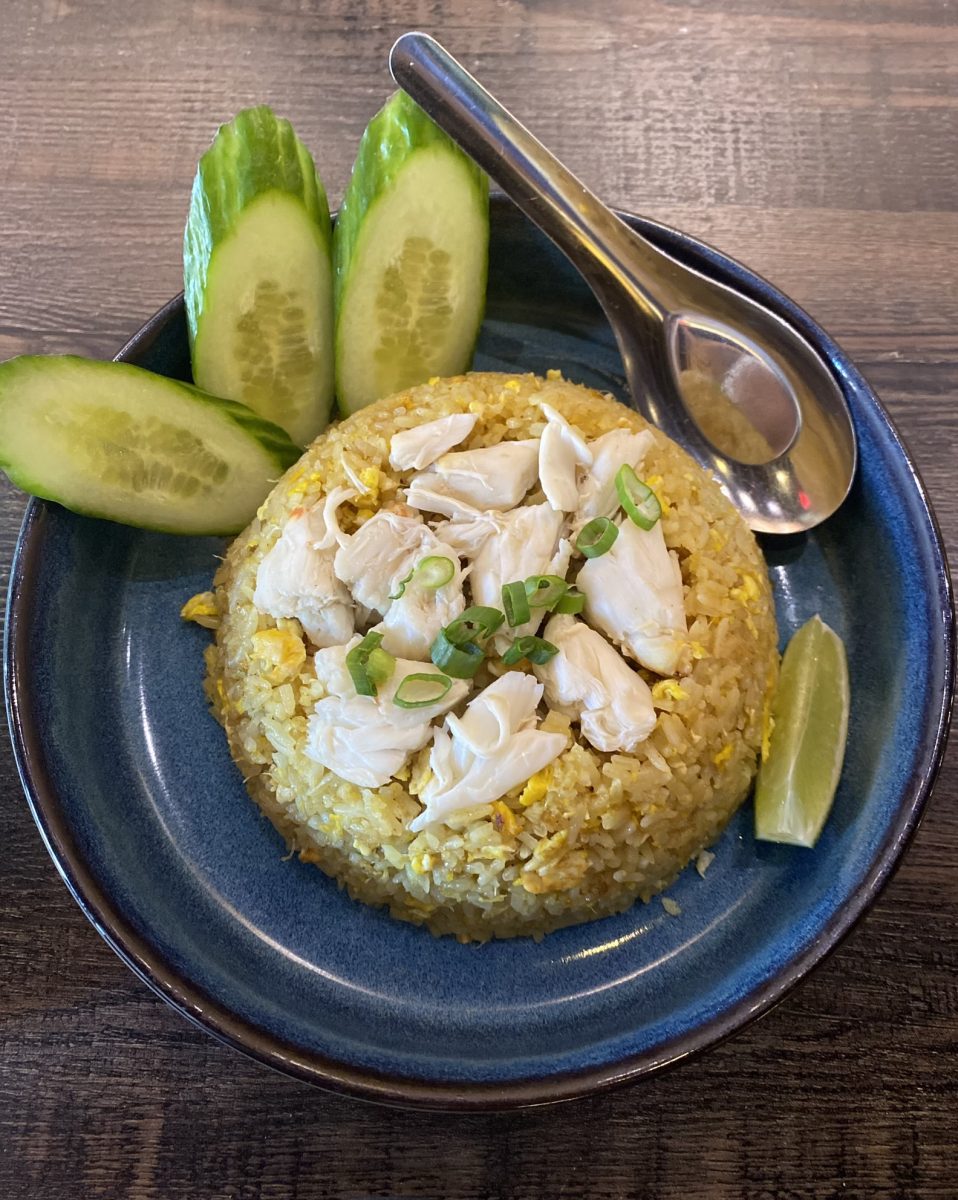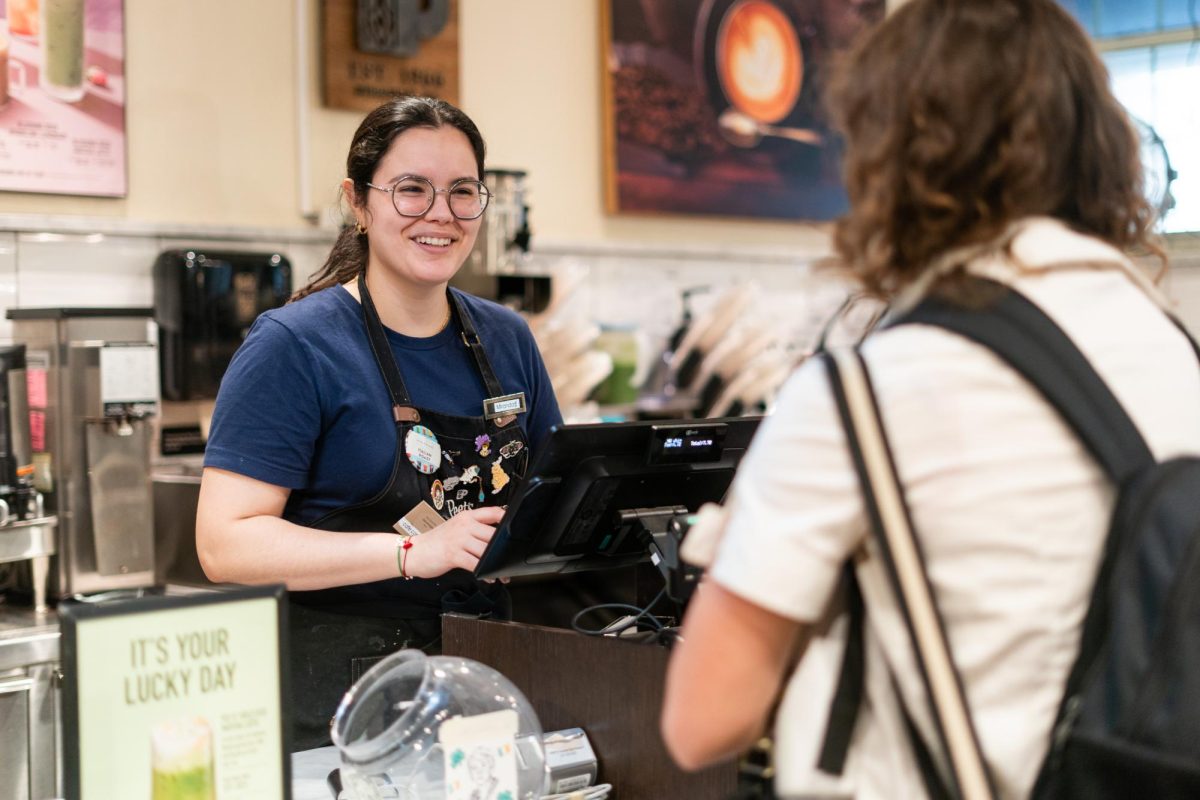With its abundance of beer, pub grub and wall-mounted televisions, Penn Social is your run-of-the-mill sports bar.
But Tuesday night, Washingtonians didn’t flock to the Penn Quarter bar and event space to watch the Atlanta Braves crush the Washington Nationals 12-0. Instead, the televisions projected lecture slides in lieu of Major League Baseball coverage as about 100 patrons gathered for a presentation on political persuasion ahead of the presidential debate between former President Donald Trump and Vice President Kamala Harris.
Ethan Porter, a GW associate professor of media and public affairs and political science, delivered the sold-out lecture for Profs and Pints — a company that organizes informal lectures by faculty members in cities across the country, from Boston to San Francisco, at off-campus spaces, like bars and cafes.
“People have been lining up to watch a debate around the city for over an hour, just at this bar alone,” Porter said during the lecture. “We’re treating it like a Super Bowl or a political event that sort of approximates the Super Bowl.”
College students, millennials, Gen Xers and Baby Boomers settled into their seats with a colorful variety of beer, wine and cocktails, while the overhead lights shifted to a patriotic color scheme of red and blue. Soon, Porter took his position at the podium to begin his political science lecture in this unlikely classroom.
“This is Profs and Pints,” Porter said during the lecture. “So you’re having some pints, but the prof has to prof for a little bit.”
In an interview, Porter said Profs and Pints reached out to him to deliver the pre-debate lecture after reading a Washington Post article over the summer that referenced his research on debates during the 2016 election cycle.
Porter said his Profs and Pints pre-debate lecture served as an opportunity for attendees to learn about political science before tuning into the “communal event” of watching the debate in a D.C. bar.
“It was likely the best of both worlds,” Porter said. “They got to learn about political science. They got to watch the debate and participate in this sort of communal exercise, and they got to do it while having a good time with their friends.”
During his presentation,”Your Prep for the Harris-Trump Debate,” Porter said studies on past presidential debates, like the 2016 debates between Trump and Hillary Clinton, have shown that debates can affect general public opinion about the candidates but have little effect on ultimate voter choice because of pre-existing loyalties to parties and policy stances.
He added that studies have shown that the voters’ opinions of candidates after their debate performances are often mediated through the pundits’ commentary on whatever news channel voters choose to tune into, whether it’s Fox News or MSNBC.
“If you’re a big Commanders fan, you’re not suddenly gonna become a big Ravens fan, because you watch a Ravens home game, but it might affect how you feel about that team in a moment,” Porter said.
Porter said while candidates are most likely to persuade voters when they have a large advantage in economic resources and media coverage, it is still a rare occurrence because partisan “lock-in,” when people solidify their political beliefs, occurs for most voters between the ages of 16 and 22. He added that viewers should think about how political pundits, like far-right Fox News commentator Sean Hannity and left-leaning New York Times columnist Ezra Klein, will react to the debate because they have significant sway over the public’s perception.
“Watch the debate, put on your Ezra Klein or Sean Hannity hat and pretend you are one of them momentarily, because that will give you at least as much insight into how the debate is understood sometime after,” Porter said.
Jocelyn Dickey, a senior at GW majoring in political communication, said she decided to attend the pre-debate lecture at Penn Social because she wanted to learn in a more casual environment than a typical GW classroom and to hear from Porter, who is also her advisor in the School of Media and Public Affairs.
“I think it puts less pressure on learning and retaining it, so you can kind of just pay attention to it, learn some cool things, and you don’t have to worry about writing a paper after or being tested later or doing anything like that,” Dickey said.
Dickey said she hoped listening to a lecture on the tactics of political persuasion right before the debate would help her spot how both of the candidates are trying to persuade voters through their rhetoric.
“Regardless of whatever party you care about or don’t care about, hate, don’t hate, they all do it, and it’s good to be aware of it,” Dickey said.
After Porter concluded his lecture, the crowd of newly dubbed pupils thinned out as some opted to tune into the debate elsewhere, but about half remained to drink in the match-up between Trump and Harris as they topped off their beers and cocktails.
Michelle Harris, an attorney for the federal government, said she went into the Profs and Pints lecture hoping to learn strategies for having conversations with Trump supporters and pushing them to change their political stances. After the lecture, she said she felt “resigned” learning how difficult it is to affect voters’ pre-existing partisan leanings.
Harris said in a blue-leaning city like D.C., she wanted to attend the pre-debate lecture because it was a nonpartisan event that could promote conversations between people of different political beliefs — something she said is lacking on social media platforms.
“Even though statistically, the majority of people here are going to be Democrats, I still like the idea of engaging in a conversation about how to persuade other people because it means you’re willing to have a conversation with other people,” Harris said.
As the clock ticked closer to 9 p.m., Penn Social’s televisions switched to the ABC News broadcast, and the remaining patrons locked in to analyze the debate with Porter’s advice in mind. Over the course of the debate, viewers punctuated the candidates’ statements with a mix of laughs, groans and cheers.
Attendees applauded and cheered on Harris’ response to Trump’s statements on abortion. Later, groans and laughs of disbelief filtered through the crowd when Trump falsely accused immigrants in Ohio of stealing and eating neighbors’ pets, and ABC News journalist David Muir’s live fact check of the false statement earned cheers from the spectators.
Hannah Bouillon, a project associate at an environmental nonprofit who played a debate-themed bingo game throughout the night, said attending Porter’s lecture helped her feel “less afraid” of the outcome of the debate knowing that the candidates’ performances would likely not have much sway over how Americans vote in November.
“I wanted to go to a debate watch party, because I wanted to watch the debate, but I wanted some moral support,” Bouillon said. “And I kind of like that there was a talk before the debate, because it kind of prepped us for the debate.”
In an interview Wednesday after the debate, Porter said most media networks have declared Harris as the clear winner of Tuesday’s debate, but it’s unclear how much impact her performance will have because past presidential debate winners have not always prevailed on election day, like Clinton in 2016.
“So many millions of people watch the debate, enjoying it, I think, mostly as a sport but secretly hoping that the debate will flip the election results, will change how millions of people vote, and I think it’s important to keep our expectations in check about whether or not that actually happens,” Porter said.




